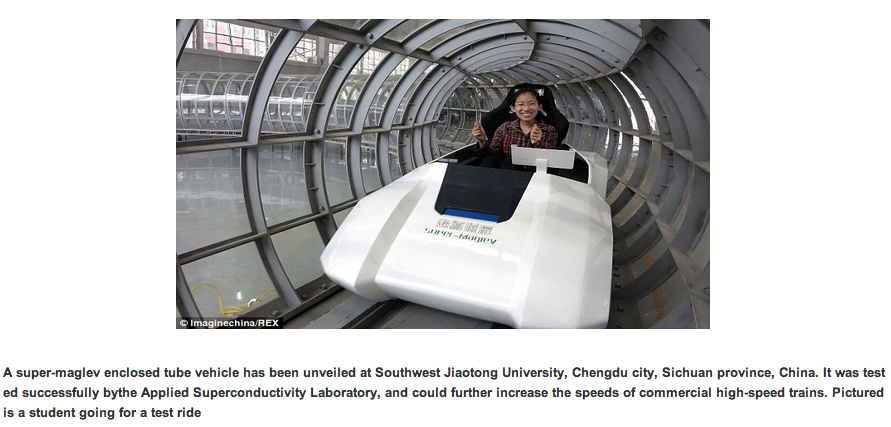
Scientists at Southwest Jiaotong University in China have built a prototype testing platform for a near-vacuum high-speed maglev train that is theoretically capable of reaching speeds up to 2900 km/h or about 1,800 mph. Currently, the fastest commercially operated maglev reaches just 431 km/h and even the world record is just 581 km/hr.
According to project lead Dr. Deng Zigang, this huge increase in speed is achieved through the lack of air resistance in the near-vacuum tunnel.
“If the running speed exceeds 400 kilometers (250 miles) per hour, more than 83 percent of traction energy will wastefully dissipate in air resistance,” he says. Additionally, overcoming that air resistance is loud, making it uncomfortable for passengers.
In his team’s tunnel, they’ve brought the air pressure to 10 times lower than atmospheric pressure at sea level, drastically reducing the amount of energy needed to overcome air resistance.
Currently, the high speed is limited by the size of the testing platform, but with longer straightaways, Deng thinks 2,900 km/h, or nearly three times the speed of a commercial aircraft, could be achieved.
To give you an idea, a train like that could take you from Paris to Moscow in about an hour, meaning you could breakfast on the Champs-Élysées and be in Red Square in time for lunch.
Source: Niconico News
Screenshot: Southwest Jiaotong University

 Here’s your chance to ride Japan’s maglev Shinkansen in spring, nine years before service starts
Here’s your chance to ride Japan’s maglev Shinkansen in spring, nine years before service starts We brave fastballs from the world’s fastest (and most terrifying) pitching machine
We brave fastballs from the world’s fastest (and most terrifying) pitching machine “Japan’s slowest roller coaster” derails, passengers don’t notice
“Japan’s slowest roller coaster” derails, passengers don’t notice The new “Snow Turtle” train is slower than running, but at least you won’t get tired
The new “Snow Turtle” train is slower than running, but at least you won’t get tired China is trying to build an empire of electric cars—but the strategy has one huge flaw that will benefit Tesla
China is trying to build an empire of electric cars—but the strategy has one huge flaw that will benefit Tesla McDonald’s new Happy Meals offer up cute and practical Sanrio lifestyle goods
McDonald’s new Happy Meals offer up cute and practical Sanrio lifestyle goods Super Nintendo World expansion gets delayed for several months at Universal Studios Japan
Super Nintendo World expansion gets delayed for several months at Universal Studios Japan Kyoto’s 100 Demons yokai monster parade returns!
Kyoto’s 100 Demons yokai monster parade returns! Beautiful Sailor Moon manhole cover coasters being given out for free by Tokyo tourist center
Beautiful Sailor Moon manhole cover coasters being given out for free by Tokyo tourist center Studio Ghibli glasses cases let anime characters keep an eye on your spectacles
Studio Ghibli glasses cases let anime characters keep an eye on your spectacles All-you-can-drink Starbucks and amazing views part of Tokyo’s new 170 meter-high sky lounge
All-you-can-drink Starbucks and amazing views part of Tokyo’s new 170 meter-high sky lounge McDonald’s Japan releases a pancake pie for new retro kissaten coffeeshop series
McDonald’s Japan releases a pancake pie for new retro kissaten coffeeshop series Studio Ghibli releases new action figures featuring Nausicaä of the Valley of the Wind characters
Studio Ghibli releases new action figures featuring Nausicaä of the Valley of the Wind characters More foreign tourists than ever before in history visited Japan last month
More foreign tourists than ever before in history visited Japan last month Use these cute hamster figures to make even boring old water absolutely adorable!
Use these cute hamster figures to make even boring old water absolutely adorable! Disney princesses get official manga makeovers for Manga Princess Cafe opening in Tokyo
Disney princesses get official manga makeovers for Manga Princess Cafe opening in Tokyo Starbucks reopens at Shibuya Scramble Crossing with new look and design concept
Starbucks reopens at Shibuya Scramble Crossing with new look and design concept Beautiful new Final Fantasy T-shirt collection on the way from Uniqlo【Photos】
Beautiful new Final Fantasy T-shirt collection on the way from Uniqlo【Photos】 Is the new Shinkansen Train Desk ticket worth it?
Is the new Shinkansen Train Desk ticket worth it? Foreign English teachers in Japan pick their favorite Japanese-language phrases【Survey】
Foreign English teachers in Japan pick their favorite Japanese-language phrases【Survey】 Japanese convenience store packs a whole bento into an onigiri rice ball
Japanese convenience store packs a whole bento into an onigiri rice ball We try out “Chan Ramen”, an underground type of ramen popular in the ramen community
We try out “Chan Ramen”, an underground type of ramen popular in the ramen community Studio Ghibli releases Kiki’s Delivery Service chocolate cake pouches in Japan
Studio Ghibli releases Kiki’s Delivery Service chocolate cake pouches in Japan Japan’s bone-breaking and record-breaking roller coaster is permanently shutting down
Japan’s bone-breaking and record-breaking roller coaster is permanently shutting down New definition of “Japanese whiskey” goes into effect to prevent fakes from fooling overseas buyers
New definition of “Japanese whiskey” goes into effect to prevent fakes from fooling overseas buyers Our Japanese reporter visits Costco in the U.S., finds super American and very Japanese things
Our Japanese reporter visits Costco in the U.S., finds super American and very Japanese things Studio Ghibli unveils Mother’s Day gift set that captures the love in My Neighbour Totoro
Studio Ghibli unveils Mother’s Day gift set that captures the love in My Neighbour Totoro Foreign passenger shoves conductor on one of the last full runs for Japan’s Thunderbird train
Foreign passenger shoves conductor on one of the last full runs for Japan’s Thunderbird train Domino’s Japan now sells…pizza ears?
Domino’s Japan now sells…pizza ears? New Japanese KitKat flavour stars Sanrio characters, including Hello Kitty
New Japanese KitKat flavour stars Sanrio characters, including Hello Kitty Kyoto creates new for-tourist buses to address overtourism with higher prices, faster rides
Kyoto creates new for-tourist buses to address overtourism with higher prices, faster rides Sales of Japan’s most convenient train ticket/shopping payment cards suspended indefinitely
Sales of Japan’s most convenient train ticket/shopping payment cards suspended indefinitely Sold-out Studio Ghibli desktop humidifiers are back so Totoro can help you through the dry season
Sold-out Studio Ghibli desktop humidifiers are back so Totoro can help you through the dry season Japanese government to make first change to romanization spelling rules since the 1950s
Japanese government to make first change to romanization spelling rules since the 1950s Ghibli founders Toshio Suzuki and Hayao Miyazaki contribute to Japanese whisky Totoro label design
Ghibli founders Toshio Suzuki and Hayao Miyazaki contribute to Japanese whisky Totoro label design Doraemon found buried at sea as scene from 1993 anime becomes real life【Photos】
Doraemon found buried at sea as scene from 1993 anime becomes real life【Photos】 Tokyo’s most famous Starbucks is closed
Tokyo’s most famous Starbucks is closed One Piece characters’ nationalities revealed, but fans have mixed opinions
One Piece characters’ nationalities revealed, but fans have mixed opinions We asked a Uniqlo employee what four things we should buy and their suggestions didn’t disappoint
We asked a Uniqlo employee what four things we should buy and their suggestions didn’t disappoint Princesses, fruits, and blacksmiths: Study reveals the 30 most unusual family names in Japan
Princesses, fruits, and blacksmiths: Study reveals the 30 most unusual family names in Japan Now bullet train geeks can ride the rare, top-secret “Doctor Yellow” train
Now bullet train geeks can ride the rare, top-secret “Doctor Yellow” train China’s first suspended railway looks like a panda soaring through the skies
China’s first suspended railway looks like a panda soaring through the skies Chinese man warned by police for driving huge self-made robot on the streets of Beijing【Video】
Chinese man warned by police for driving huge self-made robot on the streets of Beijing【Video】 We go to a festival on a Japanese Air Self-Defense Force base, walk on a runway, see cool planes
We go to a festival on a Japanese Air Self-Defense Force base, walk on a runway, see cool planes Shinkansen safety staff made to sit right next to bullet trains running at 300km/h
Shinkansen safety staff made to sit right next to bullet trains running at 300km/h Demon Slayer passes Frozen and Your Name at Japanese box office, Shinkai comments on its success
Demon Slayer passes Frozen and Your Name at Japanese box office, Shinkai comments on its success The ultimate Shinkansen trip: Riding Japan’s bullet train network from one end to the other
The ultimate Shinkansen trip: Riding Japan’s bullet train network from one end to the other As earthquakes rock the region, Kyushu Shinkansen commercial is more poignant than ever【Video】
As earthquakes rock the region, Kyushu Shinkansen commercial is more poignant than ever【Video】 Dragon Ball Super fan unleashes tirade of criticism against the series in viral video
Dragon Ball Super fan unleashes tirade of criticism against the series in viral video Walking Bicycle Club looks to change the way we ride, angers internet with promotional video
Walking Bicycle Club looks to change the way we ride, angers internet with promotional video Here are the 15 most amazing home made robots, tanks, and vehicles in China
Here are the 15 most amazing home made robots, tanks, and vehicles in China Final Evangelion movie is finally finished, because Hideaki Anno says it is
Final Evangelion movie is finally finished, because Hideaki Anno says it is Volcano Spawns Terrifying Tornado-Like Twisters【GIFS】
Volcano Spawns Terrifying Tornado-Like Twisters【GIFS】 Kim Jong-un’s “little red book” of quotes is the worst joke book you can buy for 500 yen
Kim Jong-un’s “little red book” of quotes is the worst joke book you can buy for 500 yen We accidentally dropped our newly hardened smartphone on the ground, but how is it?
We accidentally dropped our newly hardened smartphone on the ground, but how is it? A visit to Japan’s train station that looks like a spaceport in the middle of nowhere【Photos】
A visit to Japan’s train station that looks like a spaceport in the middle of nowhere【Photos】 Starbucks unveils second new festive Christmas drinkware range for 2020
Starbucks unveils second new festive Christmas drinkware range for 2020
Leave a Reply